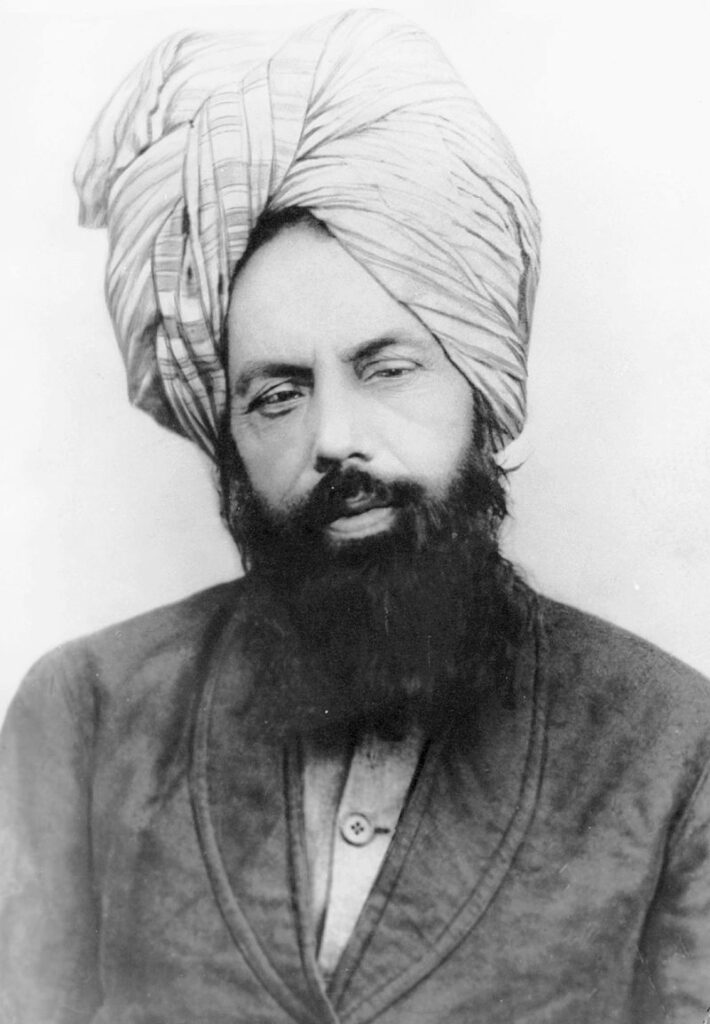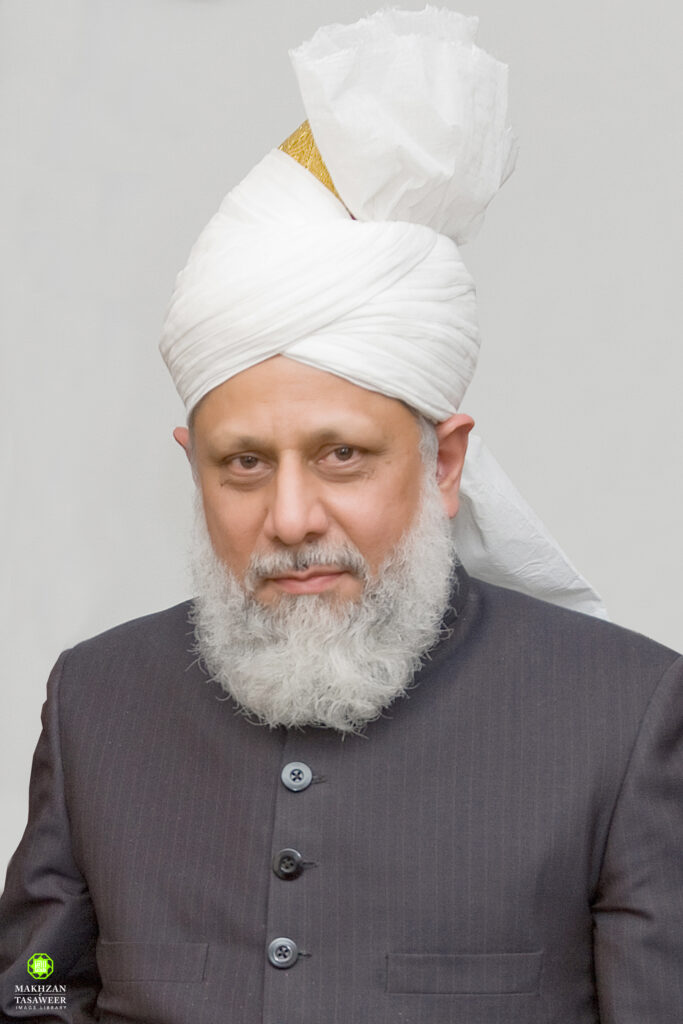The Ahmadiyya Muslim Jama’at is a religious community and organization, international in character, with established branches in over 210 countries and territories in Asia, Africa, the Americas, Europe and Australia. It has tens of millions of members worldwide and is continuously growing. This is the most dynamic denomination of Islam in modern history.

The Promised Messiah (1835-1908)
The Ahmadiyya community was founded in 1889 by Hazrat Mirza Ghulam Ahmad of Qadian (1835-1908) in a small and remote village, Qadian, in the Punjab province of India. He claimed to be the latter-day Messiah and reformer awaited in leading world religions of the world. The Jama’at that he started is an embodiment of the benevolent message of Islam: peace, universal brotherhood, and submission to the will of God – in its pristine purity. Hazrat Ahmad clearly opposed violence as a means of advancing religion and rejected terrorism in any form or for any reason. He proclaimed Islam as the future religion of man.
“Remember that nothing happens on this earth unless it has been so willed in the Heaven. And, it is God of Heaven who revealed to me that ultimately it will be the religion of Islam which will conquer the hearts of people.”
With this conviction, the Ahmadiyya Jama’at, within a century, has reached the corners of the earth. Wherever the Jama’at is established, it endeavours to exert a constructive influence of Islam through moral rejuvenation, social projects, educational institutes, health services, Islamic publications and construction of mosques, despite being bitterly persecuted in some countries.
Ahmadiyya Muslims have earned the distinction of being law-abiding, peaceful, persevering and loyal members of the communities and countries in which they reside. Some of them have earned international distinction for outstanding services. Amongst them are, the late Ch. Mohammad Zafrullah Khan who served as the Foreign Minister of Pakistan, President of the 17th General Assembly of the United Nations, President and Judge of the International Court of Justice at the Hague and Dr Abdus Salam, the 1979 Nobel Laureate in Physics.
The Ahmadiyya Jama’at in Islam was established under Divine guidance with the objective to rejuvenate Islamic moral and spiritual values. It encourages interfaith dialogue and diligently tries to correct misunderstandings about Islam, particularly in the West. It advocates peace, tolerance and understanding among fellows of different faiths. It firmly believes in and acts upon the Quranic teachings; “There is no compulsion in religion.” It strongly rejects terrorism in any form and for any reason.
The Jama’at offers a clear presentation of Islamic wisdom, philosophy, morals and spirituality as derived from the Holy Quran and the practice (Sunnah) of the Holy Prophet of Islam Muhammad (peace and blessings of Allah be on him). The Jama’at has been responsible for translating the Holy Quran into 75 major languages of the world to project the true message of Islam.

After the demise of its founder, the Ahmadiyya Jama’at has been headed by his elected successors, Khalifas. The present Head of the Ahmadiyya Muslim Jama’at, Hazrat Mirza Masroor Ahmad (may Allah be his Helper) was elected in 2003. His official title is Khalifatul Masih V.
Since being elected Khalifah, His Holiness has led a worldwide campaign to convey the peaceful message of Islam, through all forms of print and digital media. Under his leadership, national branches of the Ahmadiyya Muslim Community have launched campaigns that reflect the true and peaceful teachings of Islam. These campaigns have received worldwide media coverage and demonstrate that Islam champions peace, loyalty to one’s country of residence and service to humanity.
In 2004, His Holiness launched the annual National Peace Symposium in which guests from all walks of life come together to exchange ideas on the promotion of peace and harmony. Each year, the Ahmadiyya Muslim Prize for the Advancement of Peace is awarded to such an international dignitary who excelled in the service of mankind.
His Holiness has travelled globally to promote and facilitate service to humanity. He has also delivered lectures in different parliaments and wrote to the world leaders for the establishment of peace. Some of these include;
- Keynote Address at Capitol Hill: Video | Text
- Keynote Address at the EU Parliament: Video | Text
- Keynote Address in the Houses of UK Parliament: Video | Text
- Keynote Address at the Military Headquaters Koblenz, Germany: Video | Text
- Some other key note addresses and letters to the world leaders are featured in the book ‘World Crisis and the Pathway to Peace‘
Under the leadership of His Holiness, the Ahmadiyya Muslim Community has built a number of schools and hospitals that provide excellent education and healthcare facilities in remote parts of the world.
Following his election in 2003, His Holiness was forced into exile from Pakistan, his native country. Pakistan’s Constitution and Penal Code restricts members of the Ahmadiyya Muslim Community from practising or associating with Islam, or from even identifying themselves as Muslims. Violations of these repressive laws results in fines, imprisonment, and potentially capital punishment. Consequently, the legislation prevents His Holiness from fulfilling his duties as Head of the Community and accordingly he is unable to return to Pakistan.
Despite the continued sectarian persecution that Ahmadi Muslims are subjected to in various Muslim majority nations, His Holiness expressly forbids any violence. On 28 May 2010, anti-Ahmadiyya terrorists attacked two mosques belonging to the Ahmadiyya Muslim Community in Lahore, Pakistan. 86 Ahmadi Muslims were martyred during their Friday Prayers, whilst scores more were injured. Despite the barbaric nature of this pre-meditated crime against humanity, His Holiness instructed Ahmadi Muslims worldwide to respond only through prayers and entirely peaceful means. In his message to the ‘policy debate on the rise of extremism internationally and its impact on Britain’ by the ‘All Party Parliamentary Group for the Ahmadiyya Muslim Community’, he said;
“I am also deeply conscious of the fact that today’s debate is nearly a year after when 86 Ahmadis attending Friday prayers were killed in two mosques in Lahore. However, the message to my community then and now remains that we shall forbear this loss steadfastly with patience and prayers for those who choose to be our enemies and deny us our rights. Come what may, we shall not take the law into our own hands. Patience is an extremely important virtue because God Almighty our Creator has stated that He loves those who show patience. Normally the world considers patience to be a cowardly thing, but the exercise of patience is a great asset in the making of peace. Whenever our community is caused emotional suffering or pain we exhibit patience and tolerance. When we are deprived of our due rights as citizens, we display patience and tolerance. When financial harm is purposely inflicted upon us, we display patience and tolerance. When our properties and possessions are looted or destroyed, we display patience and tolerance. Even when our lives are taken, we display patience and tolerance. In Pakistan we are forbidden by law from practising our religion, but despite this we do not create any disorder. We bore the tragedy of May last year with patience.” (Debate held at the Jubilee Room, House of Commons, 18 May 2011)
At another occasion, in his special message to the official launch of the APPG inquiry into the persecution of Ahmadi Muslims and other religioius commmunities in Pakistan, (Suffocation of the faithful) he said;
“Despite the persecution, we face in Pakistan and the myriad of restrictions placed upon us, Ahmadi Muslims continue to serve their nation with a spirit of love, selflessness and devotion, as loyalty to one’s nation is an inherent part of Islamic faith…We earnestly desire for Pakistan to prosper and to succeed. Indeed, we want all countries to flourish and to achieve this the human rights of all people must be upheld and protected. Every nation, and every individual, must play their role in the cause of peace so that the world we bequeath to our children and future generations is a world of peace and prosperity.”